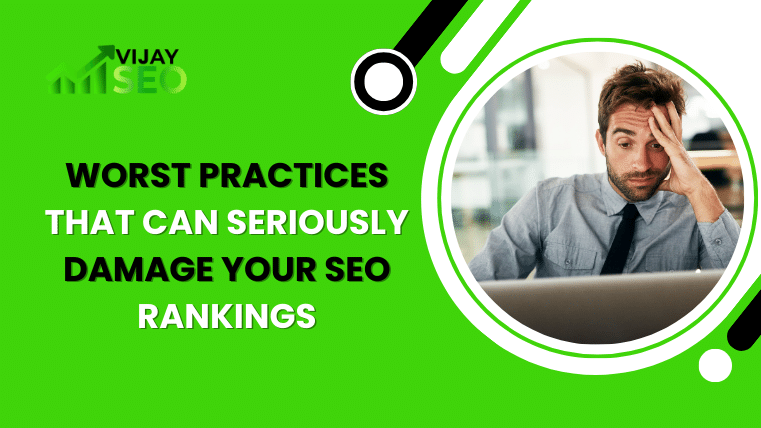Worst Practices That Can Seriously Damage Your Seo Rankings
In the ever-changing field of search engine optimization (SEO), being ahead of the curve is critical for maintaining and boosting your website’s visibility. While recommended practices are widely publicized, it’s also crucial to be aware of the bad practices that can harm your SEO rankings. In this blog post, we’ll look at some of the typical blunders that can impair your website’s search engine ranking.

Keyword Stuffing:
Keyword stuffing is an ancient and well-known SEO error. While it is important to include relevant keywords in your content, overusing them might result in a poor user experience and search engine penalties. Focus on developing genuine, valuable content that meets the demands of your audience while properly placing keywords.
Ignoring Mobile Optimization:
With the growing use of mobile devices, Google emphasizes mobile-friendly websites. Neglecting mobile optimization has a negative impact on both user experience and rankings. Make sure your website is responsive and offers a consistent experience across multiple devices.
Neglecting Quality Content:
Content remains king in the world of SEO. Low-quality, irrelevant, or duplicated material might undermine your website’s trust and ranking. Concentrate on creating valuable, informative, and entertaining content that speaks to the interests and concerns of your intended audience.
Neglecting Technical SEO:
Technical SEO influences how search engines crawl and index your website. Ignoring technical issues like broken links, sluggish website speed, or incorrect redirects might harm your results. Conduct regular technical audits to quickly detect and resolve issues.
Inconsistent Link Building:
Building backlinks is an important element of SEO, but the quality of those links is critical. Manipulative techniques, such as buying links or depending on link farms, might result in fines. Instead, concentrate on natural link-building tactics like guest posting and cultivating relationships within your sector.
Ignoring User Experience:
User experience is an important aspect in SEO. If users abandon your site quickly due to a poor layout, difficult navigation, or long loading times, search engines perceive this as a hint that your content may be irrelevant. Prioritize a user-friendly design to keep visitors interested.
Not Optimizing for Local Search:
Neglecting local SEO is a serious mistake for firms who want to reach local customers. Ensure that your company information is consistent throughout all web directories, and optimize your material for local keywords. This can dramatically increase your presence in local search results.
Avoiding these poor practices is critical for preserving and boosting your SEO results. Regularly evaluate your website, stay up to speed on industry trends, and emphasize user experience to guarantee that your efforts improve your site’s visibility in search engine results. By avoiding these traps, you’ll be on track to establish a strong and long-lasting internet presence.
Frequently Asked Questions (FAQ):
- What is keyword stuffing, and why is it detrimental to SEO?
Keyword stuffing is the practice of employing keywords excessively in web page content in order to manipulate search engine rankings. This can impact SEO by causing a negative user experience and generating search engine penalties. Instead of enhancing rankings, it may cause a decline in visibility.
- How does neglecting mobile optimization impact SEO rankings?
Ignoring mobile optimization can hurt SEO rankings because search engines prefer mobile-friendly websites. With the growing popularity of mobile devices, a poor mobile experience can result in a drop in rankings. It is critical to ensure that your website is responsive and delivers a consistent experience across all devices.
- Why is the quality of content important for SEO, and how does low-quality content affect rankings?
Quality content is essential in SEO, and low-quality, irrelevant, or duplicated content can undermine a website’s trust and rating. Search engines strive to provide useful results to users, thus content that does not fit these criteria may receive lower rankings. Producing useful, interesting, and relevant content is critical to SEO performance.
- What role does technical SEO play, and how can neglecting technical aspects impact rankings?
Technical SEO is critical to how search engines crawl and index your website. Broken links, sluggish page speed, and inappropriate redirects can all have a detrimental influence on rankings. Regular technical audits are required to discover and resolve issues quickly, ensuring that your website is search engine optimized.
- How does inconsistent link building harm SEO, and what are the consequences of manipulative link-building practices?
Inconsistent link building, particularly through deceptive tactics such as purchasing links or engaging in link farms, can affect SEO. Search engines prefer high-quality, natural backlinks, and indulging in unethical techniques might result in penalties. Building a strong and credible link profile through natural and ethical techniques is critical for retaining and boosting SEO results.
